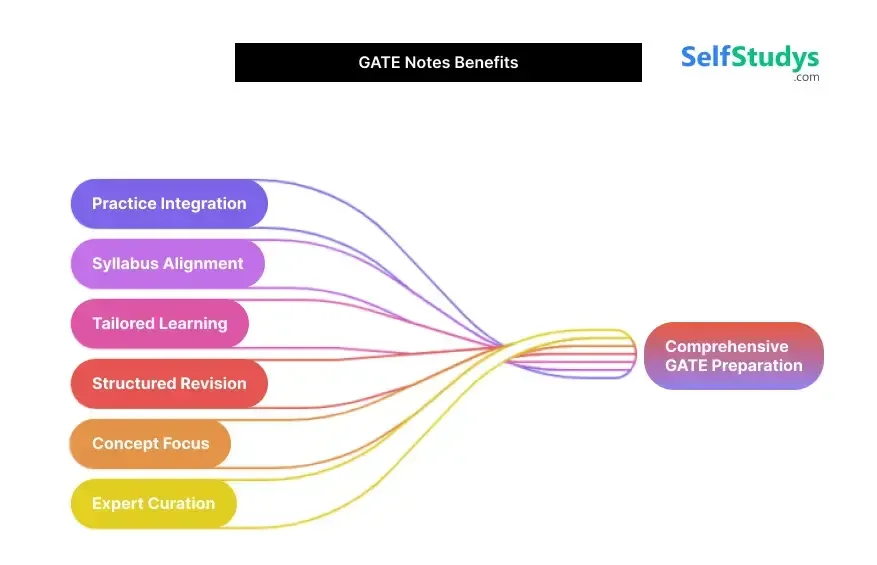GATE Notes for Exam Preparation
In order to simplify your Graduate Aptitude Test in Engineering preparation, enhance your focus on core concepts, as well as save you time, SelfStudys provides you with an excellent resource known as GATE notes. This resource is created by our subject-matter experts and experienced educators who know the pattern and difficulty level of the exam.
We cover all the major topics across various disciplines in our GATE notes PDF. This makes it easier for you to revise and retain the information properly. Our notes are available in an easy-to-download format so that you can use it conveniently offline as well. By utilizing these notes, you can build a solid foundation, practice smartly, and improve your chances of cracking the exam.
GATE Preparation Notes For Different Engineering Disciplines
At our educational website, you get to explore the GATE preparation notes PDF for several disciplines of engineering. You can have direct access to these notes by clicking on the links that are mentioned below.
Benefits Of Using Our GATE Notes PDF
The table below represents all the benefits that you can gain by studying the GATE preparation notes on our digital platform.

| BENEFIT | DETAILS |
|---|---|
|
Curated by Experts with GATE Experience |
The GATE notes PDF download are not only collected from the textbooks. They are created and reviewed by our subject-matter experts who have years experience in education field. In this way, we make sure that this resource is accurate, relevant, and aligned with the exam trends. |
|
Concept-Focused |
We prioritize conceptual clarity in our GATE preparation notes PDF. Every note explains why something works and not just how. With this resource, you will be able to develop your problem-solving skills which are quite necessary to excel. |
|
Structured for Fast Revision |
In the GATE notes PDF free download, you will find that it follows a clear and organized format. It includes bullet points, flowcharts, and tables wherever required. This makes it an ideal tool for last-minute revision without any compromise on basic knowledge. |
|
Tailored for Different Learning Styles |
It is noticed that where some students learn visually, others prefer to study quick definitions and examples. Our GATE notes have diagrams, shorts formulas, examples, summaries of theory, etc. to cater to all the preferences of learning. |
|
Aligned with the Latest Syllabus |
We keep updating our GATE notes PDF constantly so that it matches the latest syllabus and trends. This feature helps you to not waste time on studying outdated topics or skipping what is asked on a frequent basis. |
|
Linked with Practice Questions |
In our GATE preparation notes, you will see that topic-wise MCQs as well as PYQs are included. It helps you to apply whatever you have learned immediately which reinforces your memory and improves accuracy. |
Syllabus From Which GATE Preparation Notes Are Created
The Graduate Aptitude Test in Engineering is conducted for 30 test papers. You are allowed to appear in one or up to two test papers. Also, there are three different sections for the GATE exam. All the topics from different papers are included in our GATE notes PDF download. You can go through the table below to learn more about these topics.
|
GATE TEST PAPER SYLLABUS |
|
|
ENGINEERING DISCIPLINE |
TOPICS COVERED |
|
Aerospace Engineering (AE) |
Engineering Mathematics, Flight Mechanics, Space Dynamics, Aerodynamics, Structures, Propulsion |
|
Agricultural Engineering (AG) |
Engineering Mathematics, Farm Machinery, Farm Power, Soil and Water Conservation Engineering, Irrigation and Drainage Engineering, Agricultural Process Engineering, Dairy and Food Engineering |
|
Architecture and Planning (AR) |
Common: Architecture, Planning and Design, Construction and Management, Environmental Planning and Design, Urban Design, landscape and Conservation, Planning process, Housing, Services and Infrastructure |
|
Architecture: History and Contemporary Architecture, Building Construction and Structural systems, Building Services and Sustainability |
|
|
Planning: Regional and Settlement Planning, Planning Techniques and Management, Infrastructure Planning |
|
|
Biomedical Engineering (BM) |
Engineering Mathematics, Electrical Circuits, Signals and Systems, Analog and Digital Electronics, Measurements and Control Systems, Sensors and Bioinstrumentation, Human Anatomy and Physiology, Medical Imaging Systems, Biomechanics, Biomaterials |
|
Biotechnology (BT) |
Engineering Mathematics, General Biology, Genetics, Cellular and Molecular Biology, Fundamentals of Biological Engineering, Bioprocess Engineering and Process Biotechnology, Plant, Animal and Microbial Biotechnology, Recombinant DNA technology and Other Tools in Biotechnology, |
|
Engineering Mathematics, Structural Engineering, Geotechnical Engineering, Water Resources Engineering, Environmental Engineering, Transportation Engineering, Geomatics Engineering |
|
|
Chemical Engineering (CH) |
Engineering Mathematics, Process Calculations and Thermodynamics, Fluid Mechanics and Mechanical Operations, Heat Transfer, Mass Transfer, Chemical Reaction Engineering, Instrumentation and Process Control, Plant Design and Economics, Chemical Technology |
|
Engineering Mathematics, Computer Organization and Architecture, Programming and Data Structures, Algorithms, Theory of Computation, Compiler Design, Operating System, Databases, Computer Networks |
|
|
Chemistry (CY) |
Physical Chemistry, Inorganic Chemistry, Organic Chemistry |
|
Data Science and Artificial Intelligence (DA) |
Probability and Statistics, Linear Algebra, Calculus and Optimization, Programming, Data Structures and Algorithms, Database Management and Warehousing, Machine Learning, AI |
|
Engineering Mathematics, Networks, Signals and Systems, Electronic Devices, Analog Circuits, Digital Circuits, Control Systems, Communications, Electromagnetics |
|
|
Engineering Mathematics, Electric circuits, Electromagnetic Fields, Signals and Systems, Electrical Machines, Power Systems, Power Systems, Electrical and Electronic Measurements, Analog and Digital Electronics, Power Electronics |
|
|
Environmental Science and Engineering (ES) |
Mathematics Foundation, Environmental Chemistry, Environmental Microbiology, Water Resources and Environmental Hydraulics, Water and Wastewater Treatment and Management, Air and Noise Pollution, Solid and Hazardous Waste Management, Global and Regional Environmental Issues, Environmental Management and Sustainable Development |
|
Ecology and Evolution (EY) |
Ecology, Evolution, Mathematics and Quantitative Ecology, Behavioural Ecology, Applied Ecology and Evolution |
|
Geomatics Engineering (GE) |
Common: Engineering Mathematics, Remote Sensing, GNSS, GIS |
|
Surveying and Mapping: Maps, Land Surveying, Aerial Photogrammetry |
|
|
Image Processing and Analysis: Data Quantization and Processing, Digital Image Processing, Radiometric and Geometric Corrections, Image Enhancement, Image Transformation, Image Segmentation and Classification |
|
|
Geology and Geophysics (GG) |
Common: Earth and planetary system, Weathering and soil formation, Basic structural geology, Crystallography, Introduction to remote sensing, Elements of hydrogeology |
|
Geology: Geomorphology, Structural Geology, Crystallography and Mineralogy, Geochemistry, Igneous Petrology, Sedimentology, Metamorphic Petrology, Paleobiology, Stratigraphy |
|
|
Geophysics: Solid-Earth Geophysics, Geodesy, Earthquake Seismology, Potential and Time Varying Fields, Gravity Methods, Magnetic Methods, Electrical Methods, Electromagnetic Methods, Reservoir geophysics |
|
|
Instrumentation Engineering (IN) |
Engineering Mathematics, Electricity and Magnetism, Electrical Circuits and Machines, Signals and Systems, Control Systems, Analog Electronics, Digital Electronics, Measurements, Sensors and Industrial Instrumentation, Communication and Optical Instrumentation |
|
Mathematics (MA) |
Calculus, Linear Algebra, Real Analysis, Complex Analysis, Ordinary Differential Equations, Algebra, Functional Analysis, Numerical Analysis, Topology, Linear Programming |
|
Engineering Mathematics, Applied Mechanics and Design, Fluid Mechanics and Thermal Sciences, Materials, Manufacturing and Industrial Engineering |
|
|
Mining Engineering (MN) |
Engineering Mathematics, Mining Geology, Mine Development and Surveying, Geomechanics and Ground Control, Mining Methods and Machinery, Surface Environment, Mine Ventilation and Underground Hazards, Mineral Economics, Mine Planning, Systems Engineering |
|
Metallurgical Engineering (MT) |
Engineering Mathematics, Metallurgical Thermodynamics, Transport Phenomena and Rate Processes, Mineral Processing and Extractive Metallurgy, Physical Metallurgy, Mechanical Metallurgy, Manufacturing Processes |
|
Naval Architecture and Marine Engineering (NM) |
Engineering Mathematics, Applied Mechanics and Structures, Fluid Mechanics and Marine Hydrodynamics, Naval Architecture and Ocean Engineering, Thermodynamics and Marine Engineering |
|
Petroleum Engineering (PE) |
Linear Algebra, Calculus, Complex Variables, Probability and Statistics, Oil and Gas Well Drilling Technology, Petroleum Exploration, Reservoir Engineering, Petroleum Production Operations, Offshore Drilling and Production Practices, Petroleum Formation Evaluation, Oil and Gas Well Testing, Health Safety and Environment in Petroleum Industry, Enhanced Oil Recovery Techniques |
|
Physics (PH) |
Mathematical Physics, Classical Mechanics, Electromagnetic Theory, Quantum Mechanics, Thermodynamics and Statistical Physics, Atomic and Molecular Physics, Solid State Physics, Electronics, Nuclear and Particle Physics |
|
Production and Industrial Engineering (PI) |
Engineering Mathematics, General Engineering, Manufacturing Processes I, Manufacturing Processes II, Quality and Reliability, Industrial Engineering, Operations research and Operations management |
|
Statistics (ST) |
Calculus, Matrix Theory, Probability, Standard Discrete and Continuous Univariate Distributions, Stochastic Processes, Estimation, Testing of Hypotheses, Non-parametric Statistics, Multivariate Analysis, Regression Analysis |
|
Textile Engineering and Fibre Science (TF) |
Engineering Mathematics, Textile Engineering and Fibre Science, Yarn Manufacture, Yarn Structure and Properties, Fabric Manufacture, Structure and Properties, Textile Testing, Chemical Processing |
There are three more test papers included in the GATE exam which have much more vast syllabus. For your reference, we have mentioned the syllabus details for these sections below in the table.
|
XE Paper Sections |
||
|
Engineering Mathematics (Compulsory) 15 marks (Code A) |
Linear Algebra, Calculus, Vector Calculus, Complex variables, Ordinary Differential Equations, Partial Differential Equations, Probability and Statistics, Numerical Methods |
|
|
Any Two Optional Sections- 70 marks |
Fluid Mechanics (Code B) |
Flow and Fluid Properties, Kinematics of Fluid Motion, Integral Analysis for a Control Volume, Differential Analysis, Dimensional Analysis, Internal Flows, Bernoulli’s Equation and its Applications, Potential Flows, External Flows |
|
Materials Science (Code C) |
Classification and Structure of Materials, Thermodynamics, Kinetics and Phase Transformations, Properties and Applications of Materials, Characterization and Measurements of Properties, Processing of Materials, Degradation of Materials |
|
|
Solid Mechanics (Code D) |
Mechanics of rigid bodies, Mechanics of deformable bodies, Vibrations |
|
|
Thermodynamics (Code E) |
Basic Concepts, First Law of Thermodynamics, Second Law of Thermodynamics, Properties of Pure Substances, Thermodynamic Relations, Thermodynamic Cycles, Ideal Gas Mixtures |
|
|
Polymer Science and Engineering (Code F) |
Chemistry of High Polymers, Polymer Characterization, Synthesis, Manufacturing and Properties, Polymer Blends and Composites, Polymer Technology, Polymer Rheology, Polymer Processing, Polymer Testing, Polymer Recycling and Waste management |
|
|
Food Technology (Code G) |
Food Chemistry and Nutrition, Food Microbiology, Food Products Technology, Food Engineering |
|
|
Atmospheric and Oceanic Sciences (Code H) |
Atmospheric Science, Ocean Sciences |
|
|
XH Paper Sections |
||
|
Reasoning and Comprehension (Compulsory) 25 marks (Code B1) |
Reading Comprehension, Expression, Analytical Reasoning, Logical Reasoning |
|
|
Any One Optional Section- 60 marks |
Economics (Code C1) |
Microeconomics, Macroeconomics, Statistics, Econometrics and Mathematical Economics, International Economics, Public Economics, Development Economics, Indian Economy |
|
English (Code C2) |
Multi-genre literatures in English—poetry, the novel and other forms of fiction including the short story, drama, creative non-fiction, and non-fiction prose—with emphasis on the long 19th and 20th centuries. |
|
|
Especially in a comparative context, anglophone and in English translation, literatures from India and, extending to some degree, the larger Indian subcontinent. |
||
|
Literary criticism and theory; critical and cultural intellectual-traditions and approaches widely referred to and used in the discipline of English. |
||
|
History of English literature and English literary studies. |
||
|
Research approaches and methodologies, including interpretive techniques responsive to literary forms, devices, concepts, and genres |
||
|
Linguistics (Code C3) |
Language and Linguistics, Levels of Grammar and Grammatical Analysis, Historical Linguistics, Sociolinguistics, Areal Typology, Universals, Cross-linguistic Features, Methods of Analysis, Applied Linguistics |
|
|
Philosophy (Code C4) |
Classical Indian Philosophy, Contemporary Indian Philosophy, Classical and Modern Western Philosophy, Contemporary Western Philosophy |
|
|
Psychology (Code C5) |
Research Methods and Statistics, Psychometrics, Biological and Evolutionary Basis of Behaviour, Perception, Learning, Memory and Forgetting, Cognition, Personality, Motivation, Emotion and Stress and Coping, Social Psychology, Development Across the Life Span, Applications of Psychology |
|
|
Sociology (Code C6) |
Sociological Theory, Research Methodology and Methods, Sociological Concepts, Agrarian Sociology and Rural Transformation, Family, Marriage and Kinship; Theoretical Approaches, Indian Society/Sociology of India, Social Movements, Sociology of Development |
|
|
XL Paper Sections |
||
|
Chemistry (Compulsory) 25 marks (Code P) |
Atomic Structure and Periodicity, Structure and Bonding, s, p, and d Block Elements, Chemical Equilibria, Electrochemistry, Reaction Kinetics, Thermodynamics, Structure-Reactivity Correlations and Organic Reaction Mechanisms, Chemistry of Biomolecules |
|
|
Any Two Optional Sections- 60 marks |
Biochemistry (Code Q) |
Organization of Life, Enzyme kinetics, regulation and inhibition, Biochemical separation techniques, Cell Structure and Organelles, DNA replication, transcription and translation, Immune System |
|
Botany (Code R) |
Plant Systematics, Plant Anatomy, Plant Development; Cell and Tissue Morphogenesis, Plant Physiology and Biochemistry, Genetics and Genomics, Plant Breeding, Genetic Modification, Genome Editing, Economic and Applied Botany, Plant Pathology, Ecology and Environment |
|
|
Microbiology (Code S) |
Historical Perspective, Methods in Microbiology, Microbial Taxonomy and Diversity, Prokaryotic Cells: Structure and Function, Microbial Growth, Control of Micro-organisms, Microbial Metabolism, Microbial Diseases and Host Pathogen Interaction, Chemotherapy/Antibiotics, Microbial Genetics, Microbial Ecology |
|
|
Zoology (Code T) |
Animal Diversity, Evolution, Genetics, Biochemistry and Molecular Biology, Cell Biology, Gene expression in Eukaryotes, Animal Anatomy and Physiology, Parasitology and Immunology, Development Biology, Ecology, Animal Behaviour |
|
|
Food Technology (Code U) |
Food Chemistry and Nutrition, Food Microbiology, Food Products Technology, Food Engineering |
|
How To Study From The GATE Notes PDF Download Effectively?
Some strategies that will help to make your preparation efficient, personalized, and exam-ready are given below in detail. You can check out and follow them one by one as per your convenience.
- Before you jump into learning formulas or definitions of the GATE notes PDF free download, you need to understand the logic behind the concepts. This is important because most of the questions in the exam are conceptual and application-based. You should use these notes for building a mental flow.
- You should think of the GATE notes as a foundation. You need to use them as a base while you are studying the books. By doing so, you will be able to make your understanding deep as well as structured.
- You must know that not all topics in this exam have equal weightage. So, you should do an analysis of the GATE PYQs to notice high-weightage topics. Then, you should mark them in the GATE notes PDF. This will help you to focus more on these topics during revision and practice sessions.
- Only reading the GATE preparation notes will not be enough. That’s why, you need to turn the notes into questions for yourself. For this, you should study a topic, close the notes, and write down whatever you remember. Through this active recall technique, you can enhance your memory retention.
- Our experts recommend that you study the GATE notes PDF download for 30 minutes and then take a break for 10 minutes. During this break, you may summarize the topic from memory or solve the questions related to it. In this way, you will be able to keep your brain fresh and reinforce your learning quickly.
Conclusion
Clearing the Graduate Aptitude Test in Engineering can provide you with admission into some of the best colleges across the country. But for this, you need to do effective preparation by utilizing the GATE preparation notes PDF from our website. These PDFs are downloadable for free and are designed to help you grasp key concepts quite fastly. The notes also help you to revision in a smarter way and focus on what matters the most for the real exam.
Absolutely! At SelfStudys, you can utilize the GATE notes for various disciplines like Computer Science Engineering, Mechanical Engineering, Chemical Engineering, and so on. With this variety of notes, we try to make your exam preparation much more effective.
No doubt, the GATE preparation notes are quite valuable for revision purposes, but you need to combine them with other study materials. For this, you should engage with textbooks, previous year papers, mock tests, etc. By doing so, you will be able to have well-rounded preparation for the exam.
If you wish to utilize the GATE preparation notes PDF effectively, then you must read and understand the concepts, summarize key points in your own way, practice related problems, and revise the notes on a regular basis.
The team of experts at SelfStudys advise you to do revision of the GATE notes PDF on a regular basis. You can study them daily to reinforce newly learned concepts, weekly to combine the study material, before exams to notice your weaker areas, and so on.







 Profile
Profile Signout
Signout















 Quiz
Quiz
 Get latest Exam Updates
Get latest Exam Updates 










